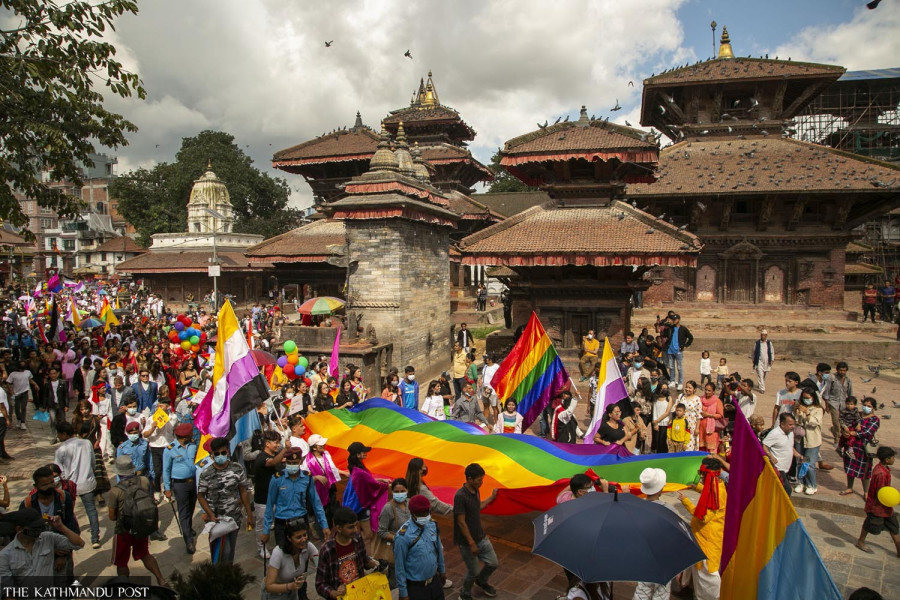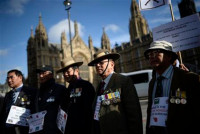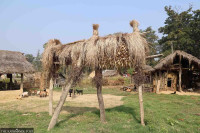National
Rise of the queer rights movement
After waging legal battles for nearly two decades, Nepali law and society have accepted the LGBTIQA+ community. The second phase of the movement centres on ensuring equality in economic, health, and education opportunities.
Aarati Ray
On November 29, 2023, Nepal registered its first same-sex marriage.
Maya Gurung, a transgender woman who has not changed her gender on official documents, and Surendra Pandey, born and identified as male, officially registered the union in Lamjung.
It came five months after the Supreme Court issued an interim order allowing same-sex couples to register their marriages, which activists hailed as a victory for LGBTIQA+ rights. Same-sex marriage has been legalised in Taiwan, making it unique in Asia alongside Nepal.
Since then, a series of notable events have followed.
In February last year, Anju Devi Shrestha (Dipti) and Suprita Gurung tied the knot to become the first lesbian couple in Nepal.
Also, 2024 saw an array of queer events such as Mr Gay Nepal, Miss Pink, and Drag Show for Visibility, emphasising the growing safe spaces for the queer community.
Nepal also hosted its first international LGBTIQ or Pink Tourism Conference in April, positioning itself as a hub for the multi-billion-dollar pink market.
With these developments, rights activists say there are plenty of reasons to laud Nepal for its influence on the global LGBTIQA+ rights movement.
Despite these positive changes, the struggle for equality continues.
“The marriage registration is a temporary arrangement for queer couples who have waited so long for their rights,” says Manisha Dhakal, executive director of Blue Diamond Society (BDS).
The Constitution of Nepal guarantees the “right to equality” and prohibits discrimination based on various grounds, including “sex or marital status.”
However, Section 67 of the National Civil Code 2017 limits the definition of marriage. It says, “If a man and a woman accept each other as husband and wife through any occasion, ceremony, formal or other act, a marriage shall be deemed to have been concluded.”
Similarly, Section 76 of the Code, concerning marriage registration procedures, is limited to marriages between men and women.
It says, “Both husband and wife shall register their marriage by filing an application with the authority appointed as per law.”
Laxmi Ghalan, Mitini Nepal's founder-chairperson, says the marriage battle for marriage equality is far from over.
As the queer community has been waiting for an enactment of a law to give legal recognition to same-sex marriages, Ghalan hopes that 2025 will be a turning point.
Right activists say that the state should treat same-sex and different-sex marriages equally and expand the legal definition of marriage from a man-woman relationship to a relationship between any two individuals.
“Besides marriage rights, the queer community lacks property, employment and education rights,” says Ghalan.
But many things are moving towards a positive direction.
In late July, the Supreme Court granted trans woman Ruksana Kapali the right to be recognised as a woman on legal documents based on self-identification without requiring medical verification.
“This is a major win for us,” says Bhumika Shrestha, a transgender activist advocating for gender minorities' rights and social justice in Nepal since 2007.
“Ruksana’s case will set a precedent for future activism and legal victories”.
In addition, the sixteenth five-year plan of the National Planning Commission that frames the country’s plan and policies has included provisions for sexual and gender minorities.
The LGBTIQA+ community has been explicitly included in the national development framework for the first time.
The plan outlines initiatives to end harmful practices like child and forced marriages targeting sexual and gender minorities, improve public spaces’ accessibility, and implement a gender-responsive budget.
“While the plan doesn’t fully address all sexual and gender minorities rights, its implementation will be key to ensuring our social and financial rights,” says Dhakal.
All three tiers of governments—federal, provincial and local—are increasingly incorporating sexual and gender minorities into their programmes. Provinces including Koshi, Madhesh, Bagmati, and Lumbini have allocated budgets for skills and training, startups, and awareness initiatives to support these groups.
“Indeed, that’s an encouraging initiative,” said Dhakal.
Queer entrepreneurs have opened restaurants in Jhapa and Morang, and beauty salons in Sunsari. The Nepal Tourism Board has also been working to harness the global potential of the pink community.
Last year, the board organised a trekking guide training programme for 25 LGBTIQA+ individuals.
According to Sunil Babu Pant, the first openly gay parliamentarian in Asia who served in the constituent assembly from 2008 to 2012, several businesses are now owned by members of the LGBTIQA+ community—with at least two dozen bars, restaurants, travel and tour companies and hotels in Kathmandu. “Businesses are opening up for the queer, and that’s a good sign. We can promote Nepal as a same-sex marriage and honeymoon destination.”
Nepal’s diverse culture includes rich LGBTIQ-related traditions. Exploring the country’s festivals, temples, symbols, rituals and stories, such as the concept of Ajima and the recognition of six genders, offers a unique cultural experience.
This year, the political landscape also saw notable moments.
In November, for the first time, transgender individuals Honey Maharjan and Mouni Maharjan contested Nepal’s local by-elections under the Janata Samajwadi Party-Nepal.
“Although they didn’t win, it was a huge milestone for us,” says Bishwaraj Adhikari, Mr Gay Handsome Nepal 2013, and a human rights defender.
Adhikari, the founder of Inclusive Galaxy Restaurant in Kathmandu, says the marriage of Nepali gay man Prajeet Budhathoki and American Joseph Foster Ellis, recognised as ‘husband’ and ‘husband’ in Dharan in October, has sent a strong message that Nepal has the potential to become a destination for same-sex marriages.
On December 17, Foreign Minister Arzu Rana Deuba surprised the LGBTIQA+ rights community by participating in the Equal Rights Coalition Conference in Berlin.
Deuba claimed that Nepal had been recognised as a global leader in protecting and ensuring the rights of sexual and gender minorities.
Highlighting Nepal’s strides in LGBTIQA+ inclusion, she positioned Nepal as a model country for others.
“It was the first time I’ve seen the government engage internationally on queer rights,” says Shrestha.
A major milestone for the queer community in Nepal is set to be the 10th ILGA Asia Conference scheduled for February 2025 with focus on social and humanitarian challenges faced by LGBTIQA+ people across Asia.
“Being chosen as the host country for the first time shows Nepal’s global reputation as a safe space for queer rights,” says Dhakal. “It should encourage the government to recognise the importance of queer advocacy in shaping policy and boosting tourism.”




 13.16°C Kathmandu
13.16°C Kathmandu















